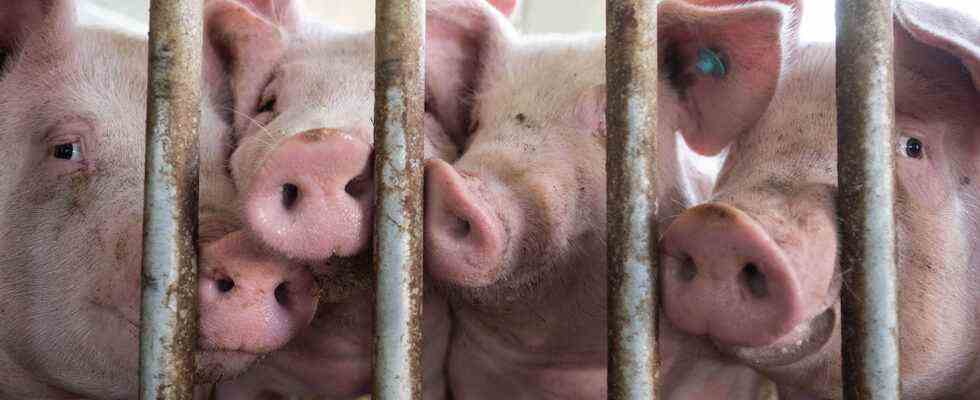Status: 02/01/2022 06:02 a.m
Pigs should be kept better – this is the goal announced by the new Federal Minister of Agriculture, Özdemir. But how new stables and more space will be financed has so far been left open. Farmers are disappointed.
“No concrete statements about the financing, and the attitude marking is literally filleted,” says Thorsten Staack, Managing Director of the interest group of pig farmers in Germany (ISN). He is already disappointed in the new Federal Minister of Agriculture, Cem Özdemir (Bündnis 90/Die Grünen). Staack describes his previous plans to improve animal husbandry as “ill-thought-out patchwork”.
Pig farmers’ association: plans “disappointing”
According to the ISN managing director, the pig farmers have their backs to the wall economically. They expected a coherent overall concept as soon as possible. In the next few weeks it will have to be seen whether Özdemir’s announcements that he wants to keep rural farms were just sonorous Sunday speeches.
The new minister has repeatedly emphasized that he wants to support farmers in making pig farming in Germany more animal and environmentally friendly. So far, however, he has not explained exactly how new stables with a run and more space for the animals are to be financed.
“No statements on details”
At the request of NDR the Federal Ministry of Agriculture only says that investment support should in future be geared towards good husbandry conditions. In addition, the ministry wants to develop a financing system to provide companies with reliable support. “We cannot make any statements about the details at this point in time,” writes a spokeswoman.
As the only concrete measure, Özdemir announced a mandatory postage labeling. It is important to strengthen consumers’ purchasing power, said the new minister NDR. According to Özdemir, those who value meat from animals raised in a species-appropriate manner should be able to do so in the future; the money that is paid more should then end up with the farmers.
Pig farmers also require labels for the catering industry
But the planned state label should initially only apply in retail, not in the catering trade. According to estimates by the Thünen Institute, around two thirds of the people in Germany buy their meat in supermarkets, discount stores or butchers, but one third also buy it outside of the trade – in restaurants, canteens or, for example, at the Schützenfest.
The managing director of the interest group of pig farmers, Staack, therefore demands that the new husbandry labeling must also apply to the catering trade. According to Staack, this is exactly where the anonymous goods end up, for which it is not clear under what conditions they were produced – in other words, exactly the goods from whose production conditions one would like to set oneself apart.
Agricultural researchers: don’t just rely on the market
The agricultural scientist Achim Spiller from the University of Göttingen does not consider the introduction of a legal label to be sufficient to finance the required changes in pig farming. It would be a danger if the state only relied on the market – i.e. on consumers and dealers – says Spiller, who currently also heads the scientific advisory board of the Federal Ministry of Agriculture (BMEL).
He suspects that in the future people will eat significantly less meat for animal and climate protection reasons. At the same time, society’s demands on future animal husbandry are high, according to the researcher; this is about a transformation similar to that in the energy or automotive industries. In his estimation, considerable investments are needed on farms.
Financing proposals for better animal husbandry
The agricultural economist is therefore calling for a so-called animal welfare tax of around 40 cents per kilogram of meat in addition to mandatory husbandry labelling. According to Spiller, the money from this consumption tax should be passed on directly to the farmers so that they could invest in more animal welfare.
The so-called Borchert Commission, to which Spiller also belongs, had developed the proposal in recent years. The committee, made up of representatives from science, politics and the agricultural sector, headed by former Federal Minister of Agriculture Jochen Borchert, was set up to develop a strategy for sustainable livestock farming.
As an alternative to an animal welfare tax, the Commission proposed raising the reduced VAT rate on animal products from seven to nineteen percent. As early as 2015, the BMEL’s scientific advisory board calculated that significantly more sustainable animal husbandry would lead to additional costs of between three and five billion euros per year.
Foodwatch calls for tougher EU laws
The consumer protection organization Foodwatch criticizes the Borchert Commission’s proposals and warns that more animal welfare cannot be achieved solely through better stalls, more space and exercise. It is said that it is more important to monitor success. For example, examinations of the carcasses could provide indications of diseases in livestock.
Above all, Foodwatch calls for stricter laws at EU level in order to create a sustainable, climate- and animal-friendly European agricultural system. On the one hand, binding guidelines for the health of livestock would have to be introduced, on the other hand, import controls so that companies in this country would not be defenselessly exposed to cheap imports from third countries with lower standards.

